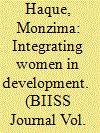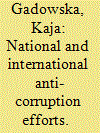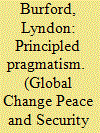|
|
|
Sort Order |
|
|
|
Items / Page
|
|
|
|
|
|
|
| Srl | Item |
| 1 |
ID:
140303


|
|
|
|
|
| Summary/Abstract |
The global movement for the recognition of women’s rights as human rights attempted to identify those rights crucial to the well being of women. The Universal Declaration of Human Rights (1948) and other subsequent assertion of equal rights to men and women in spite of their sexual identity are very crucial in this regard. Conventional wisdom suggests that the progress towards equality for men and women has not been satisfactory in developing countries like Bangladesh where women are subject to exclusion as a result of the ‘socialeconomic-political’ as well as ideological privileges of men evident in the patriarchal structure of the society. The paper argues that although women’s presence and participation in the development process of Bangladesh have not been adequate, the initiatives at various levels to address this inadequacy and progressive movements of women in diverse sectors of Bangladesh have brought in a number of affirmative changes. With this aim, the paper attempts to review the current status of women in the political, economic and social development of the country and examines the strengths and limitations of integration of women in mainstream development structure.
|
|
|
|
|
|
|
|
|
|
|
|
|
|
|
|
| 2 |
ID:
095017


|
|
|
|
|
| Publication |
2010.
|
| Summary/Abstract |
This article's objective is to analyse the influence of international anti-corruption pressure on national measures aimed at combating corruption in Poland. First, the change in perception of corruption in Poland will be addressed, along with a short discussion on attempts to reduce its scope. Second, the anti-corruption measures of international organisations, such as the United Nations, the organisation for economic co-operation and development (OECD), the Council of Europe, Group of States against Corruption and the European Union, as well as international Conventions adopted and ratified by Poland will be examined. Third, the role of state and non-governmental institutions involved in the fight against corruption in Poland will be reviewed. Finally, the process of implementing governmental anti-corruption strategies will be analysed, with a particular focus on the introduction of legislative changes that are aimed at limiting corruption through the processes of legal modernisation and harmonisation. This article argues that from among the many initiatives undertaken by various international institutions combating corruption in Poland, the most effective was found to be pressure exerted by the European Union. Poland's eagerness to enter the European Union, and to make use of structural funds after accession, forced the country's elected governments to implement certain recommendations of the European Commission regarding anti-corruption policy. However, these activities had, to a certain degree, a facade-like character and were addressed to fulfil the formal requirements of the European Commission instead of serving as a genuine effort to curb corruption. Even though corruption has been officially considered a serious social problem, which needs to be combated and many anti-corruption measures have been implemented, the effects of the actions undertaken by consecutive Polish governments are not fully satisfactory. Also, anti-corruption slogans have been instrumentally used to fight against political opponents. From another perspective, the activities of Polish non-governmental organisations have contributed to a visible reduction in social tolerance for corruption. Although public opinion research shows that the level of corruption is slowly decreasing in Poland and the country's position in the Corruption Perception Index is systematically improving, it is uncertain how strongly rooted this positive tendency will find itself in the long term.
|
|
|
|
|
|
|
|
|
|
|
|
|
|
|
|
| 3 |
ID:
138453


|
|
|
|
|
| Summary/Abstract |
When can non-governmental organisations (NGOs) affect government policies in a strong authoritarian Party-state like China? What is the status quo of state-society relations in China in the new century after decades of reform? Based on the literature of interest groups, state-society relations and civil society, this article builds and tests three hypotheses: the government-guided participation, NGO resource and vertical network. These hypotheses are tested through a quantitative study based on survey data. Findings have shown that the government-guided participation hypothesis is well-supported empirically, while the other two hypotheses have limited corroborating evidence. The Chinese political system is therefore still very much authoritarian and closed after more than two decades of reform and an “associational revolution”. It is also likely to follow a corporatist model instead of a pluralist model of state-society relations.
|
|
|
|
|
|
|
|
|
|
|
|
|
|
|
|
| 4 |
ID:
101831


|
|
|
|
|
| Publication |
2011.
|
| Summary/Abstract |
From 1995 to 2000, transnationally active, New Zealand non-governmental organisations and individuals influenced New Zealand nuclear disarmament policy in significant and sometimes pivotal ways. During this period, New Zealand emerged as a global norm leader, experiencing the zenith of its influence on international nuclear disarmament diplomacy. As such, the NGO activity examined here also had significant downstream effects on international political, legal and normative developments. This article broadens the body of empirical data on the work of transnational disarmament advocacy. Its findings reinforce and deepen constructivist understandings about the importance of non-traditional actors and ideational factors such as norms, identity, and ethics in the conduct of international relations.
|
|
|
|
|
|
|
|
|
|
|
|
|
|
|
|
| 5 |
ID:
113313


|
|
|
|
|
| Publication |
2012.
|
| Summary/Abstract |
The role of non-governmental organisations (NGOs) in global governance has attracted increasing attention over the past two decades. Yet the scholarly concern with the potential for NGOs to democratise international organisations has worked to neglect inquiry into the nature of their activities and the strategies that they deploy as policy-making participants in global governing arrangements. This article provides an account of the roles that NGOs play in international trade governance at the World Trade Organization (WTO) via their international campaign activities. Utilising examples of two NGO campaigns directed at the WTO (in the areas of intellectual property and multilateral investment rules), it demonstrates that NGOs play entrepreneurial roles in broadening the trade agenda by publicising neglected trade-related issues, building coalitions and boosting the negotiating resources of developing member countries. By examining their attempts to articulate an expanded conception of the global public interest, the article concludes that NGOs should be viewed as important actors within global public policy networks, even when they are formally excluded from the decision-making tables of international organisations.
|
|
|
|
|
|
|
|
|
|
|
|
|
|
|
|
|
|
|
|
|